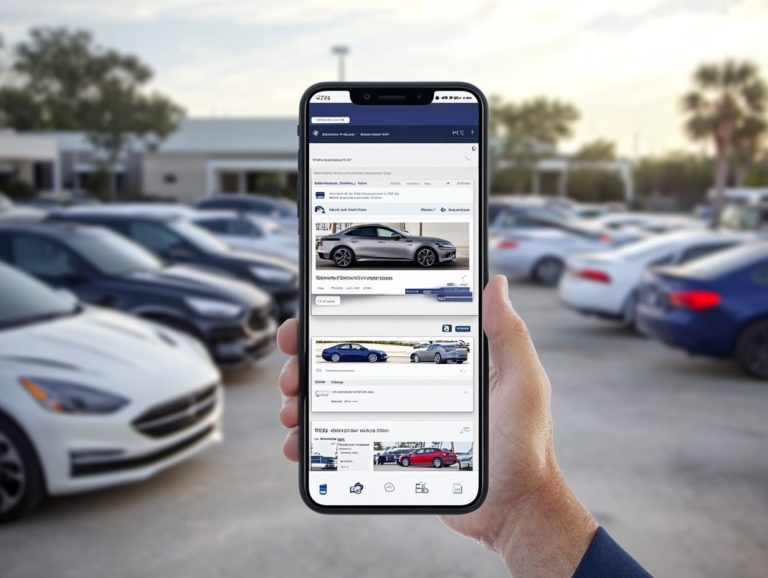How to Avoid Scams When Buying Used Cars
Buying a used car can be both thrilling and intimidating, particularly with the specter of scams hiding around every corner.
Grasping the different types of scams is essential to safeguard yourself during this journey. This guide provides crucial steps, from researching the vehicle and its seller to scrutinizing key areas for any red flags.
You’ll also find valuable tips on negotiating a fair price and ensuring a secure transaction. This will allow you to drive away with confidence.
Stay informed and ready to seize the best deal on your used car!
Contents
- Key Takeaways:
- Understanding Common Used Car Scams
- Researching the Car and Seller
- Inspecting the Car
- Negotiating the Price
- Ensuring a Safe Transaction
- Additional Tips for Protecting Yourself from Scams
- Frequently Asked Questions
- What are common scams to watch out for when buying a used car?
- How can I protect myself from odometer fraud?
- What should I do if I suspect a car has been in an accident?
- Is it safe to buy a used car online?
- What steps should I take to ensure a seller is legitimate?
- Are there any red flags to look out for when buying a used car?
Key Takeaways:

- Do your research on the car and seller.
- Inspect the car for red flags.
- Negotiate carefully and use secure payment methods.
- Trust your instincts and walk away if something feels off.
Understanding Common Used Car Scams
Understanding commonly used car scams is essential for anyone considering the purchase of a used vehicle. This knowledge gives you the power to sidestep potential pitfalls, and knowing how to inspect a used car before purchase can help prevent both financial loss and frustration.
As scams grow increasingly sophisticated, recognizing the various tactics employed by unscrupulous sellers becomes crucial. Familiarity with scams such as odometer rollback, title washing, and VIN cloning (the copying of a legitimate vehicle’s identification number to hide its true identity) can serve as your shield during the car-buying journey.
Types of Scams and How They Work
As a used car buyer, be aware of the various scams that commonly target individuals like you. Familiarizing yourself with the do’s and don’ts of used car buying can help you recognize these distinct tactics used to deceive unsuspecting buyers.
Odometer rollback involves tampering with a vehicle’s mileage, misleading you about the car’s true wear and tear. Title washing obscures a vehicle’s history, making it appear to have a cleaner title than it really does.
Curbstoning occurs when unlicensed dealers masquerade as private sellers to evade regulatory scrutiny, often peddling cars with hidden issues.
To protect yourself, always verify the vehicle identification number (VIN) against its history reports. Aim to purchase from reputable dealers whenever possible.
Researching the Car and Seller
Researching both the used car and the seller is an essential step in your buying journey. By obtaining a comprehensive vehicle history report and understanding the vehicle’s mileage, you can make a more informed decision.
Engaging with a reputable dealer or private seller is equally important. Checking maintenance records, safety standards, and any potential damages can help ensure a secure transaction.
Important Information to Gather
When you’re in the market for a used car, gathering key information like the vehicle history report, warranty terms, and service history is crucial. This ensures you make a well-informed choice.
Doing so provides insight into the car’s past and helps uncover hidden fees that could pop up during the transaction. Review any additional costs tied to ownership, such as registration fees or insurance premiums.
Being aware of the service history can reveal potential maintenance issues and confirm that the vehicle has been well cared for. Understanding the warranty terms is equally important, as it defines the coverage period and outlines what repairs might be needed post-purchase.
Arrive prepared to negotiate the price, armed with all this valuable information, leading you to a deal that leaves you feeling satisfied.
Inspecting the Car

Inspect the car thoroughly to avoid buying a damaged vehicle. Focus on key areas like the engine, tires, and interior.
Enlisting a mechanic for a detailed inspection can reveal hidden issues that might not be apparent during a casual glance.
Key Areas to Check for Red Flags
When inspecting a used car, check key areas for red flags. Start by verifying the vehicle identification number (VIN), which is a unique code for each car, against the title. Ensure the vehicle’s condition matches the seller’s description.
Stay vigilant for signs of a salvage title, as this can impact the car’s value and reliability. Note any discrepancies in the reported number of previous owners; an unusually high count might suggest hidden issues.
Inconsistent mileage readings should raise a red flag, hinting at possible tampering. Conduct thorough research. A clear title and genuine history are essential for making an informed buying decision.
Your attention to detail can safeguard you from future headaches and unexpected repair costs.
Negotiating the Price
Negotiating the price of a used car is vital. It helps you secure a fair deal and avoid lowball offers that could lead to financial regret.
When you engage with a reputable dealer or a trustworthy private seller, you can have a transparent dialogue about the vehicle’s true value and the terms of the purchase agreement.
Tips for Getting a Fair Deal
To secure a fair deal when purchasing a used car, delve into the intricacies of car maintenance costs and stay alert for what to avoid in a used car deal to prevent potential scams.
Familiarize yourself with common maintenance issues specific to the make and model you’re considering. This knowledge gives you an edge during negotiations.
Start with a lower offer while maintaining calm and patience. This approach can significantly influence the final price.
Enlist a trusted mechanic to conduct an inspection before finalizing the deal. This can uncover hidden problems that might slip through the cracks.
Building rapport with reputable dealers who prioritize customer satisfaction provides invaluable insights, potentially leading to better offers.
Equipped with this knowledge, you can confidently navigate the used car market and achieve a fair outcome that reflects the value of your investment.
Ensuring a Safe Transaction
Ensuring a safe transaction when purchasing a used car is paramount. Use secure payment methods and maintain proper documentation to reduce the risk of issues like escrow scams and complications with vehicle registration. Additionally, be aware of tips for spotting flood-damaged used cars to protect your investment.
Verify the seller’s identity and confirm the legitimacy of the vehicle to steer clear of potential pitfalls.
Secure Payment Methods and Documentation

Utilizing secure payment methods and maintaining proper documentation is crucial when purchasing a used car. To ensure you get the best value, consider learning how to find the best used car deals, which helps safeguard against fraud.
You have a variety of payment options, including cash, bank transfers, credit cards, and payment apps each with its own advantages and disadvantages.
- Cash: This option can facilitate immediate ownership transfer and might give you some negotiating power. However, it lacks tracking, which can leave you vulnerable in case of disputes.
- Bank Transfers: These are secure but can take time to process, potentially complicating your transaction.
- Credit Cards: These offer some fraud protection but may come with high-interest rates if not paid off quickly.
- Payment Apps: They provide convenience but can pose risks if your personal information isn t adequately protected.
Regardless of the method you choose, having a solid purchase agreement is essential. This acts as a legal safeguard. If you decide to use escrow websites, verify their legitimacy. Ensure funds are only released when both parties are satisfied. This creates a secure environment for your transaction.
Additional Tips for Protecting Yourself from Scams
To further protect yourself against used car scams, it’s vital to remain vigilant about additional warning signs and to understand how to research used cars effectively to avoid prevalent scams.
Equipping yourself with a buyer’s guide and seeking out consumer advice will significantly deepen your understanding of the used car market, empowering you to make a well-informed purchase.
Warning Signs to Look Out For
Recognizing warning signs when purchasing a used car can protect you against scams. To learn more about how to avoid scams when buying a car, ensuring your safety throughout the buying journey is essential.
It s essential to remain vigilant for those red flags that might indicate trouble ahead. For instance, if the title looks vague or lacks crucial details, it could suggest hidden issues in the vehicle’s history.
If the seller won t provide vehicle history reports, consider it a major warning sign; they may be hiding important information from you.
Be cautious of any pressure to rush the sale, as reputable sellers typically give buyers ample time to make informed decisions. By engaging with a trustworthy seller who values transparency, you can significantly reduce the risks associated with buying a used car.
Frequently Asked Questions
What are common scams to watch out for when buying a used car?
Common scams to be aware of when buying a used car include odometer fraud, hidden damage or mechanical issues, and title washing. To protect yourself, it’s beneficial to know how to prepare for a used car purchase. Other scams may involve fake vehicle history reports or fake sellers.
How can I protect myself from odometer fraud?

Odometer fraud is when someone rolls back the mileage on a car to make it look less used. To avoid it, always ask for a vehicle history report and get the car inspected by a mechanic. You can also check the mileage against service records and ask the seller for a signed odometer disclosure statement.
What should I do if I suspect a car has been in an accident?
If you suspect a car has been in an accident, ask the seller for a complete accident history. Get the car inspected by a mechanic right away to uncover any hidden issues, as they can often detect damage that may not show up on a vehicle history report.
Is it safe to buy a used car online?
Buying a used car online can be risky, as it is easier for scammers to hide their true identity and trick buyers into sending money for a car that doesn’t exist. If you choose to buy a car online, thoroughly research the seller and never send money without seeing the car in person or having it inspected.
What steps should I take to ensure a seller is legitimate?
To ensure a seller is legitimate, ask for their full contact information and verify it before making any payments. You can also research the seller’s reputation online and ask for references from previous buyers.
Are there any red flags to look out for when buying a used car?
Some red flags to watch out for when buying a used car include a seller who is unwilling to let you have the car inspected or take it for a test drive, a car that is priced well below market value, or a seller who pressures you into making a quick decision. Trust your instincts and walk away if something doesn’t feel right.
Stay safe while shopping for your next car. Trust your instincts and don t rush the process!






